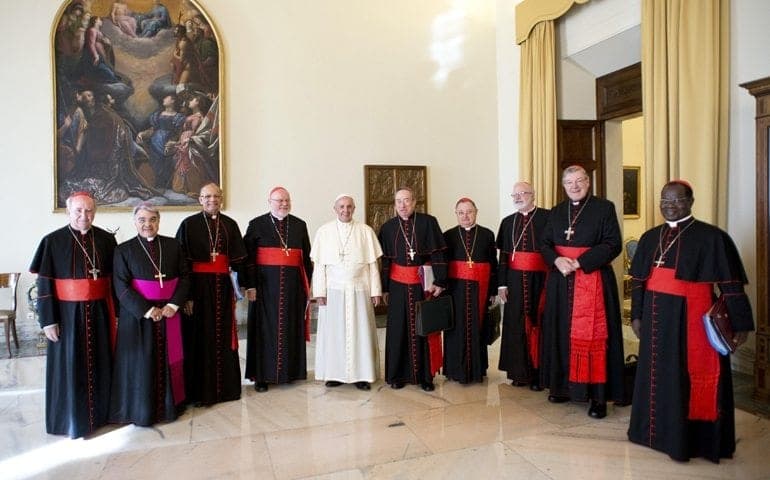ROME – At one level, it could be said, it probably doesn’t matter a great deal in ecclesiastical terms what the Bishop of Albano, Italy, says about the implementation of Pope Francis’s much-discussed document on the family, Amoris Laetitia, and its cautious opening to Communion for Catholics who divorce and remarry outside the Church.
Located in the hills outside Rome near the erstwhile summer papal residence of Castel Gandolfo, Albano is a place the vast majority of Catholics in the world probably have never been, and its bishop generally a figure few of them could pick out of a lineup.
Yet Bishop Marcello Semeraro isn’t just any old shepherd of Albano, because he’s also the secretary to the “C9,” the council of cardinal advisers from around the world created by Francis shortly after his election to serve as his kitchen cabinet. Its formal remit is to develop a plan for reform of the Roman Curia, but in reality, Francis uses it as a sounding board for many of his important decisions.
That means Semeraro is often in the room when the sausage of this papacy is being ground. He knows the pope’s mind and will as well as just about anyone, so when he released a set of pastoral guidelines on implanting Amoris Laetitia for his presbyteral council on Friday, the contents attracted more than the usual amount of attention.
Summing up, one could say that Semeraro didn’t walk back from the cautious “yes” Francis delivered on the Communion question, extending it to a range of other roles in the Church from which divorced and civilly remarried Catholics at times have been excluded, including:
- Member of the parish council
- Lector at Mass
- Religion teacher in a Catholic school
- Catechism teacher
- Catholic charities workers
- Serving as godfather/godmother for a baptism
None of those roles, he stressed, should be automatic.
“On the part of the bishop, or a pastor or confessor, it’s not at all a matter of conceding a sort of permission form to enter the community of the faithful, or more simply, for being able to take Communion,” Semeraro wrote.
“Put in those terms, the question is radically misleading,” he said.
Among other things, Semeraro identified certain conditions as indispensable for any meaningful discernment, such as the status of one’s previous union and loyalty to the new one, as well as awareness that the new situation is “irregular.”
In terms of the new union, the 70-year-old Semeraro said it should be “consolidated in time and lived in fidelity, marked by sincere affection and responsibility with regard to the children, sustained by prayer and habitual participation in the life of the parochial community.”
“Amoris Laetitia never talks about a generalized ‘permission’ for receiving the sacraments on the part of all divorced and civilly remarried persons,” Semeraro said. “It also doesn’t say that the path of conversion begun by those who desire it must necessarily lead to access to the sacraments.”
Instead, Semeraro wrote, the emphasis in Amoris is on discernment, without pre-determining where that might lead.
“The heart of it is accompaniment and discernment,” he said, meaning “the search for the will of God that needs to be realized, and of steps and concrete means for putting it into practice.”
On the other hand, Semeraro also appeared to discourage making the requirements for Communion for the divorced and civilly remarried unnecessarily restrictive.
“It’s fundamental that what’s proposed always take account of the real situation in life of the interested parties,” he said,” and “avoid making disproportionate requests that are beyond their abilities, and, for that matter, beyond what’s asked of other faithful.”
It’s no longer possible, Semeraro wrote, simply to say that everyone living in an “irregular” situation is therefore automatically “in a state of mortal sin, deprived of sanctifying grace.”
What’s called for, he said, is an “examination of conscience” to “verify if there’s sincere repentance, never asking more from the penitent than he or she is capable of giving.”
Part of the task of the pastor, Semeraro wrote, is to “indicate to the faithful the moral horizon of Christian life … helping the person to see what depends on him or her in the situation being lived at the moment, and what doesn’t.”
He rejected “one-size-fits-all” solutions.
“A new general norm as in canon law, equal for all, is absolutely out of place,” he said. What’s needed, he said, is to “accompany” specific situations.
The instruction was titled Rallegratevi con me, Italian for “Rejoice with Me,” and makes special reference to chapter VIII of Amoris Laetitia, where Francis deals with “irregular” situations such as divorce and remarriage outside the Church.














